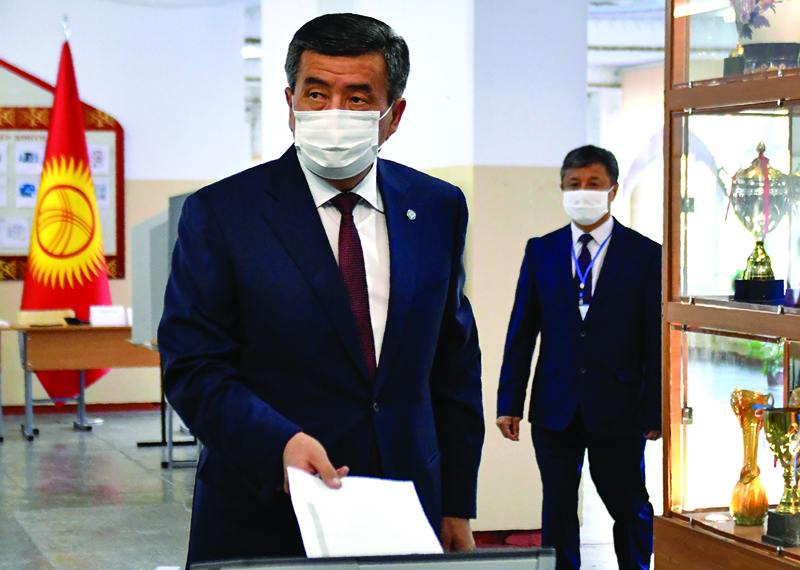
BISHKEK: Kyrgyzstan held a parliamentary election yesterday with many voters disillusioned with the political elite and anxious about the worst economic crisis in two decades. President Sooronbai Jeenbekov's supporters look likely to win a significant number of seats in the legislature in the Central Asian country, a close ally of Russia. But the current pro-presidential ruling coalition is certain to be upset due to internal splits in the two major political groups, testing the president's ability to forge new political alliances.
"There is less and less democracy, systemic opposition is virtually non-existent," Nasyrbek Attokulov, a 50-year-old university lecturer, said after casting his ballot in Bishkek. The campaign was marred by allegations of vote-buying, and an August opinion poll ordered by the US-backed International Republican Institute showed that 15 percent of respondents favored the idea of voting against all parties. A total of 16 parties are contesting 120 seats in the single-chamber parliament. If none of them wins more votes than the "Against all" option, a new election would have to be called.
The economy and corruption topped voters' concerns. The European Bank for Reconstruction and Development expects Kyrgyzstan's gross domestic product to plunge 9.5 percent in 2020 due to the pandemic and take years to recover. "The economic situation is terrible," said a businessman, who identified himself only by his first name Kanat, speaking at a polling station where officials let in voters in small groups after measuring their temperature as a coronavirus precaution. "We need to establish the rule of law."
The country of 6.5 million people has a history of political turmoil: in the past 15 years, two presidents have been toppled by revolts and a third is in prison after falling out with his successor. Further instability would be a concern to Russia. Moscow operates a military airbase in the former Soviet republic and is already dealing with major crises involving its allies Belarus and Armenia. Two parties that won more than a half of the seats in the 2015 election have split ahead of yesterday's vote, and some of their MPs including Jeenbekov's closest allies are seeking reelection under new banners.
The Birimdik (Unity) party is viewed as loyal to Jeenbekov and includes the president's brother and former parliamentary speaker Asylbek Jeenbekov among its candidates. Its main rival, Mekenim Kyrgyzstan (My Homeland Kyrgyzstan), is associated with a powerful clan whose figurehead Rayimbek Matraimov-a former customs service official-was the target of anti-corruption protests last year. Both parties have spoken in favour of further integration with the Russia-led Eurasian Economic Union bloc, which has raised the status of hundreds of thousands of Kyrgyz migrants working in Russia since Bishkek joined in 2015.
But Birimdik's party chairman Marat Amankulov sparked indignation after comments emerged from last year of him saying it was "time to return" to Moscow's fold. Rivals accused him of undervaluing Kyrgyz independence. In a meeting with Russian leader Vladimir Putin in Sochi ahead of the vote, Jeenbekov warned of "forces" that wanted to "drive a wedge into the (Kyrgyz-Russian) alliance"-an apparent reference to a pro-sovereignty rally held in opposition to Amankulov's comments in the capital Bishkek last Sunday. On Friday, the state prosecutor said it was investigating a video widely distributed on messaging apps.
The video, which purported to show two male students from a top university secretly filmed in a hotel room, appeared to imply that opposition parties were supportive of homosexuality, which is deeply frowned on in the conservative country. The opposition parties targeted in the video said this was an attempt to smear them ahead of the vote.
Political drama
Popular uprisings unseating two authoritarian presidents in the space of five years were seen as the driving force behind a fresh constitution to curb authoritarian excess and contain political in-fighting in 2010. Electoral laws dictate that no one party can take more than 65 seats in the legislature. Presidents are limited to a single six-year term-a departure from the strongman trend seen in neighboring China, Kazakhstan, Tajikistan and Uzbekistan.
Tensions between the president and his predecessor Atambayev grew following Jeenbekov's electoral victory in 2017, peaking last year with a shootout at Atambayev's residence between the former president's armed supporters and state security forces trying to arrest him. Atambayev was detained on charges of illegally releasing a crime boss from jail and jailed for 11 years in June. He has also been charged in the murder of a special forces officer who died during the raid. - Agencies




